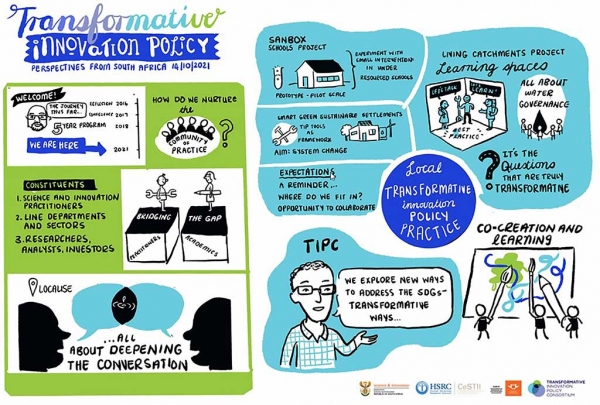Paradigm shift: The value of transformative innovation policy for South Africa

'The Transformative Innovation Policy Consortium is a five-year transdisciplinary research and action programme where STI policymakers from the Global North and South worked with a research team to articulate the concept of transformative innovation policy, explore how to use it in practice, and build capabilities around it.' (Ghosh et al., 2021) Credit: Nicolene Louw (Fine Line Illustrations, 2021)
Harnessing innovation can help us achieve inclusive and sustainable development goals, but it requires system-wide transformation, write Glenda Kruss and Il-haam Petersen.
Policymakers globally agree that innovation is critical to addressing our societal and environmental challenges, in line with the Sustainable Development Goals set out in the 2030 Agenda, ‘Transforming our World’. Doing so across different countries requires systemic transitions and transformative change – and this means new ways of doing things and new ways of framing policy problems and their solutions. System-wide transformation requires innovative solutions beyond technological interventions alone. Piecemeal, short-term and partial policy interventions can quickly reinforce persistent challenges, or even create new complexities.
The debate in South Africa is now about how innovation is best harnessed to achieve inclusive and sustainable development goals. ‘Transformative innovation policy’ is a new approach that builds on the potential of citizen movements, firms, governments and knowledge organisations to co-create solutions using participatory approaches.
South Africa has participated actively over the past four years in the Transformative Innovation Policy Consortium, which brings together policymakers, academics and practitioners to experiment with new approaches to policy design, implementation and evaluation.
Local policymakers are no strangers to designing implementation plans using a logical framework model, now established practice in many government departments. Many have learned to set clear goals for their interventions, using a logframe or linear theory of change to define input activities and their expected outputs, outcomes and impacts. Despite this, many policy interventions fail to achieve their intended outcomes and impact. Monitoring, evaluation and learning tend to focus on managing objectives and compliance. Typically, policy actors do not coordinate their efforts; there is insufficient consideration as to what works (or doesn’t) and why, or interventions are not adequately designed to achieve the intended outcomes and impact.
What transformative innovation policy does differently is to focus attention on the conditions and dynamics that prevent the desired changes from taking place. It draws on sustainable-transitions theory to shift our focus to socio-technical systems change to enable change in the desired directions. It also tries to bring together academic and policy knowledge through intentional and reflexive praxis (a way of learning that explores one’s understanding of oneself to improve how one carries out especially work tasks) in settings where collaborative learning (co-learning) takes place.
Globally, the transformative innovation policy approach is evolving gradually, driven by a range of country teams, through a set of learning journeys, each adapting a ‘reflexive action framework’ and tools to contextualise real-world policy experiments. There is no step-by-step blueprint to achieve transformation. Instead, what is needed is intense commitment to working with complex concepts, making clear how to open up dominant ways of doing things (regimes) and fostering change as shown by new kinds of emerging practices (niches).
For transformative innovation policy to add value in South Africa, a foundation for reflexive policy action and a supportive community of practice are required. To this end, the South African Transformative Innovation Policy (TIP SA) working group – located at the HSRC’s Centre for Science, Technology and Innovation Indicators (CeSTII) – and the DST/NRF/Newton Fund Trilateral Chair in Transformative Innovation, the 4IR and Sustainable Development at the University of Johannesburg are testing out together with the Department of Science and Innovation ways to address priorities such as promoting sustainable and inclusive human settlements, shifting to a hydrogen and sustainable-energy economy, adopting sustainable and inclusive sanitation technologies, and seeing to a transformed and innovative public sector.
Many of these efforts are aimed at bringing about system change by introducing something that ‘does not exist yet’ and to stretch the thinking of policymakers. A team working on the Living Catchments Project – an initiative of the Water Research Commission – has systematically used co-learning and co-creation to implement a planned policy intervention more effectively. By bringing together the efforts of different water and environmental networks working in the same fragile ecosystems, they are better able to align each of their policies and desired new practices.
In 2021, the TIP SA working group hosted a series of online learning engagements to encourage local policy teams to reflect on their experience. They looked at the value and challenge of defining transformative outcomes, defining a transformative theory of change, and strategies to open and shift dominant socio-technical systems in a field of practice.
The engagements preceded a colloquium in October 2021 (‘Transformative Innovation Policy: Perspectives from South Africa’) aimed at strengthening synergies among stakeholders and addressing local needs. The aim is to engage critically with the main concepts and practical tools, to serve as a foundation for building a reflexive community of practice.
Read more: https://www.tipconsortium.net
Authors: Dr Glenda Kruss, the executive head, and Dr Il-haam Petersen, a chief research specialist, at the HSRC’s Centre for Science, Technology and Innovation Indicators (CeSTII)
